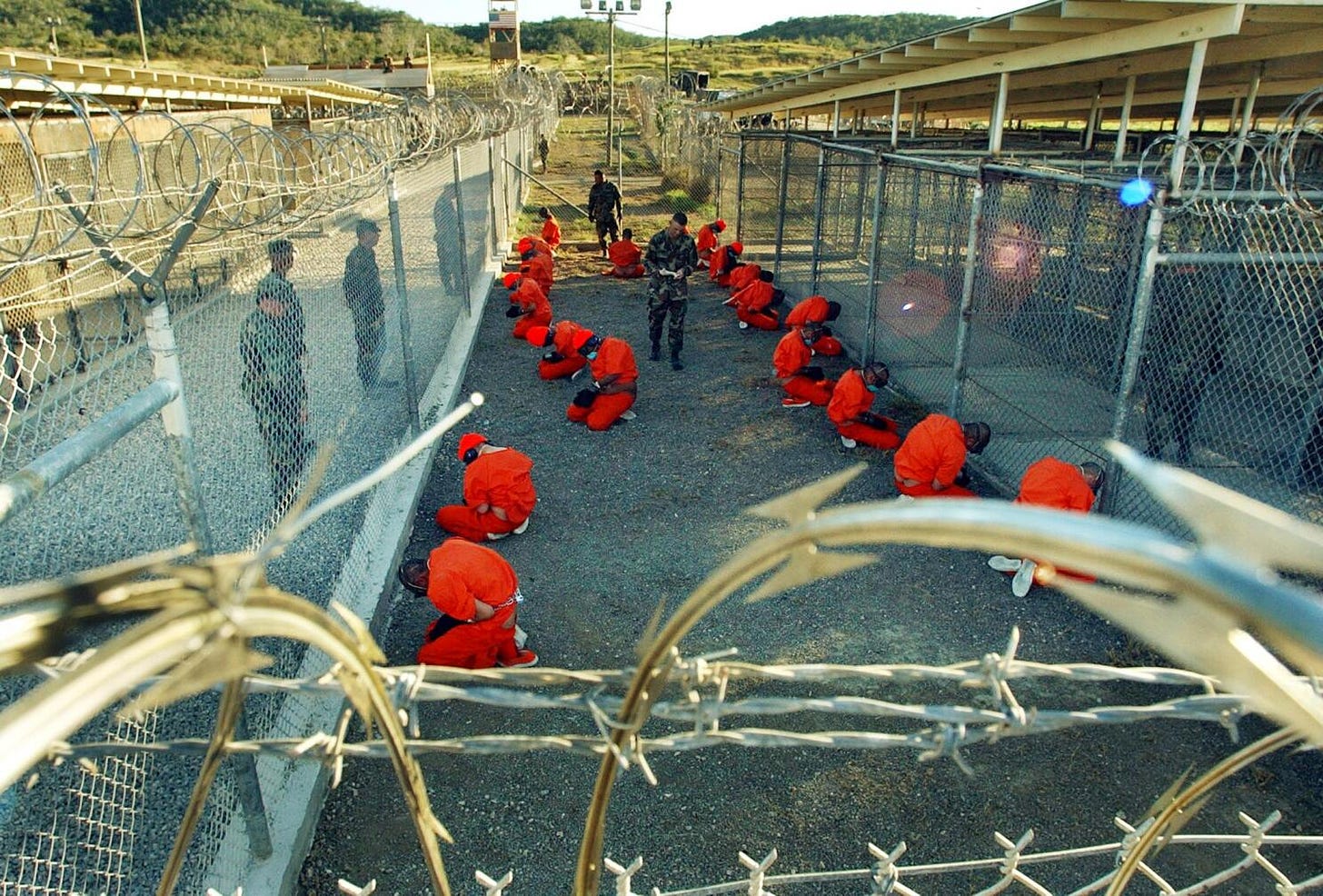Yves here. Lambert was early to identify what he called “authoritarian followership” among Team Dem. It’s now going to its logical conclusion as the Democrats and even many supposedly lefties are fine with the trashing of civil rights and liberty if that expedites bringing down Hair Furore.
By Thomas Neuburger. Originally published at God’s Spies

“In Trump-related cases, the DOJ has pushed the tactical envelope in all the same ways it has with other types of unpopular defendants over the years, only it’s done so with a disturbing … presumption that the public wants them to color outside the lines more than ever, and deal even more cruelly with targets. The DOJ has political winds at its back[that] it lacked even in the early War on Terror days.”
—Matt Taibbi, writing about the increasing power of the prosecutorial state
“The FBI has always been a tool of repression of left-wing movements.”
—Alex Vitale, author of The End of Policing
“The CIA is not your friend.”
—Edward Snowden, here
Two things can be true at the same time:
• Donald Trump can be an indefensible excuse for a president and represent a danger to the Republic (the formal institution of our government).
• At the same time, the National Security State can be exercising a power grab the likes of which will end both our democracy and our republican version of it.
Of course, both things can also be false, or just one true. If I were a novelist, I’d make both things true. But that’s just a novelist’s view. Let’s see what we find when we take a real-world view.
The Once and Future Danger
I take it as a given that Trump is a dangerous president. You can give your reasons, if you have them, as easily as I can give mine. Our lists might even match.
The point is not to argue our lists. The point is to wonder what made liberals — people who used to hate “spook state” agents like the FBI and CIA — suddenly love them, support their penetration of media via “unaffiliated” spokespeople, and blind themselves to the conversion of J. Edgar Hoover’s criminal, blackmail enterprise into modern angels of democratic deliverance in the present American mind?
A recent democratic angel of such deliverance is George W. Bush, he of torture and war crimes fame. Another is from the Cheney family, Trump-hating Liz Cheney, enemy of all that progressives hold dear save her animosity toward the Previous Occupant.
Are either of them friends of freedom? Not if you look at them — or retain the semblance of a memory — but they’re certainly praised as such, these days that is. Some Democrats might even finance her run for the presidency, should she choose to make one.

Who’s the once and future danger? Is it only Trump?
Hoover’s FBI, of course, has been credibly linked to the murder of Malcolm Xand less credibly linked to the murder of Martin Luther King. And the misdeeds of the National Security State writ large are numerous and indefensible. From the murder of Americans by the CIA drone operation(2010), to spying on the Supreme Court by the FBI (2012), to outright and unpunished lying under oath to Congress by Director of National Intelligence James Clapper (2017) — it’s surprising to me that fervent defenders of democracy, folks to the left of the Right, your friends and mine, have become their fast friends as well, some even their defenders.
So surprisingly strong is the defense of the FBI by its former attackers that even the venerable folks at Democracy Now are taking a look. Describing a recent broadcast, they wrote (all bolded emphasis mine):
“There Are Good Reasons to Defund the FBI. They Have Nothing to Do with Trump” “Defund the FBI” is the growing call by Republicans after the FBI searched former President Donald Trump’s Mar-a-Lago estate. We get response from Alex Vitale, author of “The End of Policing,” who lays out reasons to defund the FBI that have nothing to do with Trump. Vitale reviews the history of the FBI, which he says has “always been a tool of repression of left-wing movements,” and calls the FBI investigation into Trump a “shortsighted” attempt to shut down some of the most extreme parts of the right wing. He uplifts efforts to “reduce the power and scope of the FBI in ways that limit their ability to demonize and criminalize those on the left.”
Has Trump made us blind, or has the prosecutorial state reformed itself?
Is that question even being asked?
The DOJ’s Trojan Horse
All this leads me to recommend a full read of a series that appeared recently at Matt Taibbi’s Substack site. In a piece called “What Happened to America’s Civil Libertarians?” Taibbi details how disturbing it is for readers to even see these doubts expressed:
Over the weekend I published a feature on Justice Department use of bullying tactics and unfair practices, called “The Justice Department Was Dangerous Before Trump. It’s Out of Control Now.” Despite the fact that the bulk of the article focused on targets broadly sympathetic to the left, like the late radical lawyer Lynne Stewart and a civil rights firm in Baltimore raided for the crime of representing another lawyer, a flood of emails and social media posts ensued, most on the predictable theme that this piece [—] packed with facts and testimonials by people other than myself [—] was right-wing grift: “What happened to you, man?”
But the piece he refers to is solid and solidly researched. I strongly recommend reading it all.
In it he examines the use of “taint teams” by the FBI, a practice whereby they go into a target’s office, often a lawyer defending someone under investigation, and scoop up everything they can find, with the intention of assigning one of their own (but “not part of the investigation”) to look at everything and sort it out later. They’ve been doing this long before Trump took center stage.
Judges were especially upset with prosecutors who were taking advantage of technological changes to seize masses of electronic data — usually computers or cell phones containing private information outside the scope of the warrant request — and, in defiance of courts, keeping that information. In a case involving seizure of emails from a defense contractor suspected of a kickback scheme, a D.C. Magistrate named John Facciola expressed concern that the government would “keep data indefinitely” despite the fact that it is “illegal” to refuse to return “seized documents not described in a warrant.” Facciola, who’d dealt with this issue more than once, blew his top … [but he was] overturned by a judge, Richard Roberts, who said the government’s take-everything, construct-probable-cause-later method was okay so long as there was “sufficient chance of finding some needles in the computer haystack.” This was the kind of judicial advice the feds liked: seize now, worry later.
Of one such raid of the law office of Joshua Treem, “the lawyer of the lawyer of a suspect,” Taibbi writes:
The U.S. Attorney’s office in Maryland had long been pursuing a lawyer named Ken Ravenell, one of the top criminal attorneys in Baltimore, believing he was essentially part of the criminal operation of a Jamaican marijuana kingpin named Richard Byrd. That the feds raided Ravenell’s office in 2014 was one thing. The real shocker came in 2019, when the U.S. Attorney and the I.R.S. raided the law office of Ravenell’s lawyer, Joshua Treem. If the Lynne Stewart case was about intimidating the lawyer of a suspect, this case was about intimidating the lawyer of the lawyer of a suspect. The DOJ didn’t just take Treem’s files. It took huge amounts of data and files from the firm where Treem was and is a partner, Brown, Goldstein, and Levy. This group of lawyers had been repeatedly recognized as a top firm by U.S. News and World Report and Best Lawyers in America, with several attorneys winning annual “Baltimore Lawyer of the Year” awards, including Treem himself. Despite their standing, the Justice Department treated Treem’s firm like terror suspects, delivering a surprise search replete with armed, kevlar-clad agents, on the basis of a warrant issued in an ex parte hearing with a district judge, meaning the firm had no chance to contest the raid. The Brown, Goldstein, and Levy lawyers were in a state of shock. “For a civil rights law office, mid-morning on a business day, in the middle of Baltimore, they felt the need to get fully armed,” says Treem, laughing in amazement as he recalls the scene. “They never even sent a subpoena,” says fellow partner Kobie Flowers. “That was part of our argument later in the Fourth Circuit. We’re all officers of the court. We all have ethical duties to follow. We can’t destroy evidence. Had you just sent a subpoena for this stuff, we would have given it over to you.”
Why do all this?
One consequence of becoming a criminal suspect was that Treem, who’d received a target letter six months before, had a conflict of interest that prevented him from defending Ravenell, which of course might have been part of the point. “I had to withdraw from representing my client,” says Treem. “Once I got the target letter, I had to advise my current clients and any people who were calling me to ask for representation.” Asked if such tactics could be interpreted as a message, that any attorney who wants to stay in business should think twice about representing someone the government is serious about pursuing, Flowers said the intimidation factor goes further than that. “On the one hand, it’s a strategy move. They get to kick Josh off the case,” he said. “But the next step, or a corollary to that thought, is: for many criminal defense attorneys, it causes them to question whether they want to be in this profession?”
The FBI and DOJ also get a peek — and chance to copy and use without revealing their sources to the defense — all of the communication and files of all of the other lawyers at the firm. What’s the benefit of that? Taibbi answers:
The government took 37,000 emails from Treem’s inbox alone, of which only 62 were from Ravenell or contained his name. Treem’s firm had over twenty lawyers, files about whom were taken into the custody of a separate office of the Maryland U.S. Attorney’s office. As a judge in the case later wrote, referencing Treem and Ravenell as Lawyer A and Client A: An “extensive” portion of the seized emails were “from other [Law Firm] attorneys concerning . . . other attorneys’ clients that have no connection with th[e] investigation[s]” of Lawyer A and Client A. Notably, some of those Law Firm clients “are being investigated by, or are being prosecuted by, the United States Attorney’s Office [for the District of Maryland] for unrelated crimes.” In other words, the U.S. Attorney’s office in Maryland decided to cruise through the defense files of clients that same office was already investigating and/or prosecuting.
Is the Justice Department out of control when it comes to its prosecutorial powers and abilities? Has the National Security State, of which the FBI and the DOJ are part, slipped its leash thanks to 9/11 and our new-found love of making life miserable for terrorists?

The permanently detained and never-to-be-tried at Guantánamo Bay
Has the FBI, in the words of one of its liberal defenders, “reformed and modernized”? Or is it, in Taibbi’s words, “a Trojan Horse, inside which the Justice Department has assembled an army for a grand assault on civil liberties”?
Left and Right vs. Right and Wrong
These questions are currently handled through a left vs. right framework. I’d argue they should be handled through a right vs. wrong framework. “Is the criticism true or not?” is a different question than “Does it help Trump or not?”
If the nation becomes an authoritarian hellhole, it may not be the Right that’s in charge. The national security state, with bipartisan support, is already a candidate.
Of course, a lonely writer and a few thousand loyal readers aren’t going to decide this matter for the nation. The nation will decide for itself which spinning wheels it wants to be dazzled by.
I wait with bated breath for the day it decides. I will release that breath when I see what flows from the result.
And I hope to God that the result is not presaged by the lines of the famous poem “First they came…”, whose middle verse might soon be revised to say: “Then they came for Trump, but I hated the bastard, so f-ck him.”


